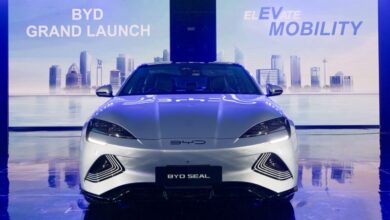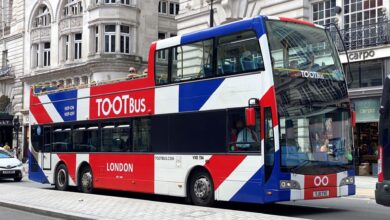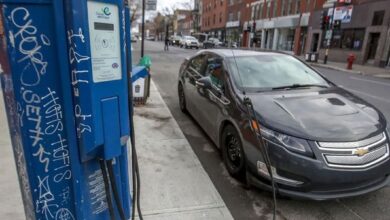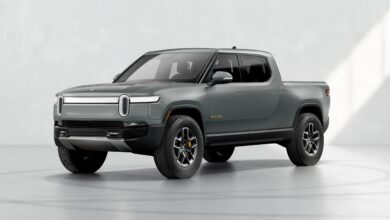Honda to build $15 billion EV project in Ontario
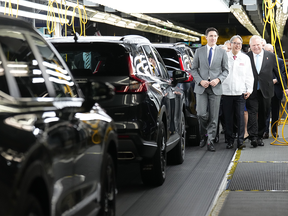
Government incentives expected to total $5 billion, split evenly between Ottawa and the province
Article content
After months of rumours, Honda Motor Co. Ltd. on Thursday confirmed it is building an electric-vehicle assembly plant, a battery production plant and a cathode active material plant in Alliston, Ont., for an estimated $15 billion, making it the largest investment yet in the country’s EV supply chain.
The EV assembly plant is expected to begin production in 2028 with an annual capacity of 240,000 vehicles, and the battery plant will have an annual capacity of 36 gigawatt hours (GWh) per year. Together, they will add approximately 1,000 workers to Honda’s workforce.
Advertisement 2
Article content
Article content
“The world is changing rapidly,” Toshihiro Mibe, chief executive of Honda, said during the announcement, alongside Prime Minister Justin Trudeau and Ontario Premier Doug Ford, as well as Deputy Prime Minister Chyrstia Freeland, Industry Minister François-Philippe Champagne and Ontario Trade Minister Vic Fedeli. “And we must work towards achieving carbon neutrality.”
He described the Honda plant as “a vertically integrated and comprehensive EV battery chain in Canada.”
Mibe said the company will also build midstream battery facilities in Ontario, including a cathode active material plant through a joint venture with Korea’s LG Energy Solution Ltd., and a separator plant with Japan’s Asahi Kasei Corp.
‘Whole ecosystem’
Government incentives for Honda’s plant are expected to total $5 billion, split evenly between the federal government and the province, according to Canadian Press, with the federal government expected to offer 10 per cent tax credits on the cost of constructing buildings, and 30 per cent on the cost of new machinery, while the province will provide direct and indirect support.
Advertisement 3
Article content
“A whole ecosystem will be built with four new plants in Ontario,” said Trudeau, adding that the economic benefits would spread across the country.
Honda’s planned plant is one of several planned EV battery projects in the country, and the third in Ontario, each of which is creating thousands of construction jobs in the short term and thousands of permanent jobs once completed and production begins.
Provincial and federal governments have lured automakers to invest here with financial incentives, such as tax credits worth billions of dollars, which compete with incentives the United States is offering through its Inflation Reduction Act.
The federal government announced the 10 per cent tax credit in its budget last week. It is structured so that companies that invest across segments of the supply chain, including battery production, EV assembly and cathode production, are eligible. That may entice companies such as General Motors Co. and Ford Motor Co., which have already invested in one of those segments, to expand their operations in Canada.
PBO questions benefits
Advertisement 4
Article content
Premier Ford called the Honda investment a “game changer” and noted the province has attracted more than $43 billion in EV and battery supply chain investments in the past few years.
“Massive investments like this don’t happen by accident,” he said.
Although the federal government’s financial incentives have drawn criticism, with the Parliamentary Budget Office describing the economic benefits of such largesse as marginal, they have also been supported by politicians across the spectrum, including the federal Liberals, Ontario’s Progressive Conservatives and Coalition Avenir Québec, as a way to save and even grow Canada’s auto industry.
The country has set ambitious goals that all new vehicle sales must be zero-emission vehicles (ZEVs) by 2035; there are also interim targets that ZEV sales reach 20 per cent of all new vehicle sales by 2026 and 60 per cent by 2030.
Last year, total EV sales in Canada increased by 49 per cent, though sales of passenger EVs declined by 12.6 per cent according to Fitch Solutions Inc., a market research company.
Overall, EVs, including plug-in electric hybrids, represented 10.8 per cent of all new vehicles registered last year in Canada.
Advertisement 5
Article content
Five major automakers — Honda, Toyota Motor Corp., Ford, GM and Stellantis NV — have manufacturing plants in Canada and Volkswagen AG is building one. Only Toyota has yet to announce how it plans to adapt its operations to the EV mandates.
‘Good for auto sector’
Canada’s auto industry is a key pillar of the economy, accounting for eight per cent of all exports in 2022, and 29 per cent of all exports in Ontario, according to Statistics Canada.
Earlier this week, Doug Ford commented on the sheer size of the new battery facilities, noting Stellantis is building a 4.2 million battery cell manufacturing facility in Windsor.
“VW is building a 16-million-square-foot facility — large enough to accommodate more than 200 football fields,” he said. “It’s like a city in itself.”
Dan Guatto, director of energy transition at EY’s business consulting team in Toronto, said that more companies are transitioning their vehicle fleets to EVs because they save money on maintenance and fuel costs.
He said it’s a good idea for politicians to use financial incentives to lure auto industry investments.
Advertisement 6
Article content
“It’s certainly good for the auto sector. The automotive sector here has been in decline for a couple of decades,” he said. “The investments demonstrate Canada is a good place to do business.”
Honda was the first Japanese automaker to build manufacturing operations in Canada, starting in the late 1980s, and it currently operates two assembly plants in Alliston, about 85 kilometres north of Toronto, where it produces the CRV and Civic models. It also builds engines there for some of the vehicles it assembles elsewhere.
So far, the company has yet to produce fully electric vehicles in North America, though it is building an EV manufacturing hub in Ohio.
Honda’s announcement means it’s the third year in a row that Canada has attracted a new battery cell manufacturing plant.
In 2023, VW announced plans to build a battery factory in St. Thomas, Ont., that would eventually be capable of producing 90 gigawatt hours’ worth of battery cells per year while Northvolt AB announced it would build a 30-GWh battery plant about 30 kilometres east of Montreal.
In 2022, Stellantis announced a joint venture called NextStar with LG Energy Solution to build a 45-GWh plant.
Advertisement 7
Article content
The Honda announcement had been in the works for years, with federal and provincial officials often saying they were taking trips to Japan to persuade automakers to invest in Canada.
Recommended from Editorial
“This is the largest investment Honda has ever made in Canada,” Freeland said.
• Email: gfriedman@postmedia.com
Bookmark our website and support our journalism: Don’t miss the business news you need to know — add financialpost.com to your bookmarks and sign up for our newsletters here.
Article content



